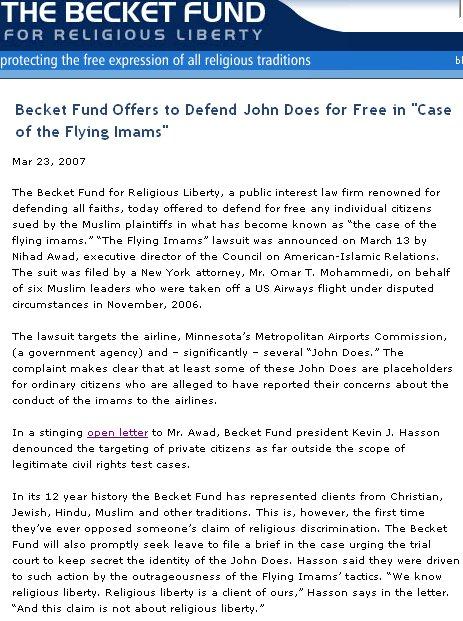In response to 6 imams and their Council on American-Islamic Relations (CAIR) lawyers including “John Doe” airline passengers (who reported suspicious behaviors) as defendants in a lawsuit against US Airways, House Republican Steve Pearce, of New Mexico, introducted the “Protecting Americans Fighting Terrorism Act of 2007.” The bill reads:
LIALBILITY PROTECTION FOR INDIVIDUALS WHO REPORT SUSPICIOUS BEHAVIOR. (a) An individual shall not be liable for any injury or damages relating to such individual’s qualified disclosure of suspicious behavior, A civil action for damages related to such disclosure may not be brought in any State or Federal Court. (b) QUALIFIED DISCLOSURE OF SUSPICIOUS BEHAVIOR. — For purposes of this section, the term “qualified disclosure of suspicious behavior” means any disclosure of the allegedly suspicious behavior of another individual or individuals to a Federal, State, or local law enforcement agency or other security personnel that is made in good faith and with the reasonable belief that such behavior is suspicious.
The bill would have been next considered, voted on, or tabled by the House’s Judiciary Committee, led by John Conyers. Yet Tuesday night, 105 Democrats and 199 Republicans approved a motion “to recommit the Democrats’ Rail and Public Transportation Security Act of 2007 back to committee with instructions to add the protective language.” The debate was passionate:
Rep. Peter T. King, New York Republican and ranking member of the House Homeland Security Committee, offered the motion saying all Americans — airline passengers included — must be protected from lawsuits if they report suspicious behavior that may foreshadow a terrorist attack. “All of our lives changed after September 11, and one of the most important things we have done is ask local citizens to do what they can to avoid another terrorist attack, if you see something, say something,” said Mr. King. “We have to stand by our people and report suspicious activity,” he said. “I cannot imagine anyone would be opposed to this.” Mr. King called it a “disgrace” that the suit seeks to identify “people who acted out of good faith and reported what they thought was suspicious activity.”
Rep. Bennie Thompson, Mississippi Democrat and chairman of the House Homeland Security Committee, opposed the motion over loud objections from colleagues on the House floor, forcing several calls to order from the chair. “Absolutely they should have the ability to seek redress in a court of law,” said Mr. Thompson, who suggested that protecting passengers from a lawsuit would encourage racial profiling. “This might be well-intended, but it has unintended consequences,” Mr. Thompson said, before he accepted the motion to recommit.
The motion to recommit was based on a bill introduced last week by Rep. Steve Pearce, New Mexico Republican, to protect “John Does” or passengers targeted in a lawsuit filed by six Muslim imams earlier this month in Minneapolis. Mr. Pearce said the imams are “using courts to terrorize Americans.” “If we allow this lawsuit to go forward it will have a chilling effect,” Mr. Pearce said.
The Democrat’s leadership in the House can neither tolerate bipartisan votes (without their prior approval) that actually protect Americans nor dissention in the ranks so they want to change the rules:
House Democrats want to change rules that allow Republicans to modify bills on the floor — a tactic the GOP has used several times, including a maneuver this week to insert a shield law for “John Doe” passengers to report potential terrorists without fear of legal reprisal. House Majority Leader Steny H. Hoyer, Maryland Democrat, threatened to change the rules during a press briefing Tuesday, just hours before Republicans used the procedural motion to recommit the Rail and Public Transportation Security Act of 2007 back to committee to include the protective language.
…
“House Republicans are successfully offering solutions on the House floor that are winning bipartisan support and addressing problems the American families are concerned about,” House Minority Leader John A. Boehner, Ohio Republican, said yesterday. “Democratic leaders are trying to shut it down.”According to a report in CQ Today, Mr. Hoyer will spend the upcoming two-week recess crafting changes in the rules so Republicans can no longer blindside the majority with motions to redraft legislation. “We don’t think that’s appropriate,” Mr. Hoyer said. “We don’t think that serves the legislative process, and we’re going to address that.” If the rule is not changed, Mr. Hoyer said, “we are going to be, on every bill, open to an amendment that is totally unrelated to the substance of the bill.”
Republicans say Democrats are desperate to change the rules because they have successfully passed seven of 19 motions to recommit with support from rank-and-file Democrats. “House Democrats can expect a vigorous fight from House Republicans and a lot of criticism from the American people,” Mr. Boehner said.
Republicans also have used the motions to prevent illegal aliens from voting in union-organizing elections, and to protect U.S. military recruiters from discrimination by federally funded colleges and universities.
“Perhaps before they game the system by changing the rules to their liking, the Democrat leadership should ask its own members why they are voting in droves for our proposals,” Mr. Boehner said.
At least in this latest case, maybe Democrats in the House think the people back home would be upset at them if they voted against protecting them, as airline passengers acting in good faith, from civil liability should they ever report suspicious activity to authorities.

